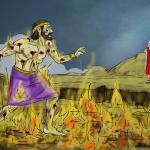
In the previous three instalments of this series, we established several key foundations:
- Job was not a Hebrew and didn’t have any knowledge of the Lord as revealed through Abraham. He was a man with his own view of God, whose behaviour and ultimately, whose words, demonstrate the nature of those beliefs.
- Job lived in fear of disaster, of punishment for sin. He never knew or trusted the goodness of God. His spirituality was based on two key pillars – his own goodness and terror of the Lord. If he mis-stepped in the first he’d fall foul of a legalistic, vengeful God.
- That although Job initially watches his tongue, refusing to ‘curse God’, this stemmed from fear rather than authentic faith.
- That in chapters 7 – 11, Job abandons all restraint and reveals his heart. He accuses God of injustice and defends his own perfection as a righteous man.
The next twenty-one chapters are repetitious, re-cycling the same arguments between Job and his friends. There is no new logic or material introduced, though Job’s accusations towards God multiply, as does his defence of his own innocence. For the sake of brevity, I won’t break down each chapter here, but will offer a resource for digging deeper into the text at the end of the article.
Job’s accusations against God multiply
In Chapter 14, verse 18-19, Job speaks ill of the Lord, calling him a destroyer rather than a bringer of hope:
But as a mountain erodes and crumbles
and as a rock is moved from its place,
as water wears away stones
and torrents wash away the soil,
so you destroy a person’s hope.
In chapter 16, 9, Job calls God his opponent for the first time:
God assails me and tears me in his anger
and gnashes his teeth at me;
my opponent fastens on me his piercing eyes.
In chapter 19, 5-6, he declares that God has wronged him:
If indeed you would exalt yourselves above me
and use my humiliation against me,
then know that God has wronged me
and drawn his net around me.
He accuses God of violence in verses 7-11:
‘Though I cry, “Violence!” I get no response;
though I call for help, there is no justice.
He has blocked my way so that I cannot pass;
he has shrouded my paths in darkness.
He has stripped me of my honour
and removed the crown from my head.
He tears me down on every side till I am gone;
he uproots my hope like a tree.
His anger burns against me;
he counts me among his enemies.
Job continues to justify himself throughout chapters 23-26, and by chapter 27, 2-7 his heart towards God has become clear:
As surely as God lives, who has denied me justice,
the Almighty, who has made my life bitter,
as long as I have life within me,
the breath of God in my nostrils,
my lips will not say anything wicked,
and my tongue will not utter lies.
I will never admit you are in the right;
till I die, I will not deny my integrity.
I will maintain my innocence and never let go of it;
my conscience will not reproach me as long as I live.
‘May my enemy be like the wicked,
my adversary like the unjust!
According to Job, God is unjust, a destroyer of hope, and his enemy. His primary concern is to justify himself – he is still trusting in his own perfection, his own righteousness, to save him.
In Chapter 31, Job bemoans all he has lost, talking at length about how respected he used to be. He talks of the poor he used to help, and boasts of his own righteousness in verse 1:
I made a covenant with my eyes
not to look lustfully at a young woman.
He is confident that he could stand, perfect before God and be vindicated:
let God weigh me in honest scales
and he will know that I am blameless –
Job’s self-righteousness knows no bounds. He lists many sins, insisting that he is guilty of none of them. Here is just a short extract from a long passage of self-justification:
If I have seen anyone perishing for lack of clothing,
or the needy without garments,
and their hearts did not bless me
for warming them with the fleece from my sheep,
if I have raised my hand against the fatherless,
knowing that I had influence in court,
then let my arm fall from the shoulder,
let it be broken off at the joint.
For I dreaded destruction from God,
and for fear of his splendour I could not do such things.
Verse 23 is revealing (‘For I dreaded destruction from God, and for fear of his splendour I could not to such things’). His reason for refraining from sin is not for the sake of doing good, or from love of others, it is because he dreaded destruction from the Lord. This chimes with his earlier statement from chapter 3, v 25 –
What I feared has come upon me;
what I dreaded has happened to me.
Job has no idea of the kindness of God; he has no faith in divine compassion. His image of God is cruel and vengeful, of a God that searches for faults, and his whole long life has been a quest for perfection, to stave off the Lord’s destruction.
By the end of the chapter 31 (v. 35-37), Job’s heart towards God is fully exposed:
I sign now my defence – let the Almighty answer me;
let my accuser put his indictment in writing.
Surely I would wear it on my shoulder,
I would put it on like a crown.
I would give him an account of my every step;
I would present it to him as to a ruler.
God is Job’s accuser, and ought to put his indictment in writing. Job’s sense of self-righteousness is something he wears ‘like a crown’, and which he would present to God in his defence. These are the closing words of Job – a self-righteous man, who justifies himself and accuses God. His words are blasphemous, and after all the pressure of his sufferings, and the unhelpful goading of his friends, his heart is revealed.
Elihu is the first person to speak the truth
Everything changes from chapter 32 onwards. Job’s three friends give up trying to persuade him of their point of view, and Elihu speaks up instead (v. 2-3). Elihu is God’s mouthpiece in this scenario. He has been angered by everything he’s heard and cannot contain himself any longer:
But Elihu son of Barakel the Buzite, of the family of Ram, became very angry with Job for justifying himself rather than God. He was also angry with the three friends, because they had found no way to refute Job, and yet had condemned him.
Elihu continues his rebuke (v. 8-12):
But you have said in my hearing –
I heard the very words –
“I am pure, I have done no wrong;
I am clean and free from sin.
Yet God has found fault with me;
he considers me his enemy.
He fastens my feet in shackles;
he keeps close watch on all my paths.”
‘But I tell you, in this you are not right,
Elihu is the first to show any understanding of the merciful nature of God, speaking of how the intercession of a single angel can save a person from punishment (chapter 33, 23-26):
Yet if there is an angel at their side,
a messenger, one out of a thousand,
sent to tell them how to be upright,
and he is gracious to that person and says to God,
“Spare them from going down to the pit;
I have found a ransom for them –
let their flesh be renewed like a child’s;
let them be restored as in the days of their youth”–
then that person can pray to God and find favour with him,
they will see God’s face and shout for joy;
he will restore them to full well-being.
And the first to understand righteousness received by faith (v. 27-28):
And they will go to others and say,
“I have sinned, and I have perverted what is right,
but I did not get what I deserved.
God has delivered me from going down to the pit,
and I shall live to enjoy the light of life.”
The contrast between Elihu’s understanding of righteousness and Job’s is telling. Job believes that to be righteous, he must be perfect in all he does, or God will strike him down; Elihu understands that the key to a right relationship with God is to receive his mercy – that we do not get what we deserve. How central to the Christian Gospel is Elihu’s message? He is the first person in the book to speak well of God and with real wisdom.
In chapter 34, Elihu challenges Job’s accusations towards God (v. 17):
Will you condemn the just and mighty One?
He speaks of Job’s sin (v. 35-37):
Job speaks without knowledge;
his words lack insight.”
Oh, that Job might be tested to the utmost
for answering like a wicked man!
To his sin he adds rebellion;
scornfully he claps his hands among us
and multiplies his words against God.’
Elihu’s rousing speech, which continues through chapters 35-37, is one of praise for God, justifying the Lord instead of Job. Throughout, he talks of his words gushing forth, of being unable to restrain himself, speaking the only wisdom we have read in the book so far. He speaks like a prophet, and his wise words usher in the presence of the Lord, who speaks at last. I am convinced that Elihu was God’s man.
Next time, I’m going to wrap up the series by looking at God’s response to Job, and Job’s ultimate repentance. For those who want to sink their teeth into this straight away, I’ve written a book called Job: A Story of Salvation that examines the text chapter by chapter (under a pen name, James Bewley). For UK readers, Job: A Story of Salvation can be found here. I urge anyone who feels stuck in the mire of heavy, Evangelical dogma to read this book – it will cast off your shackles!













